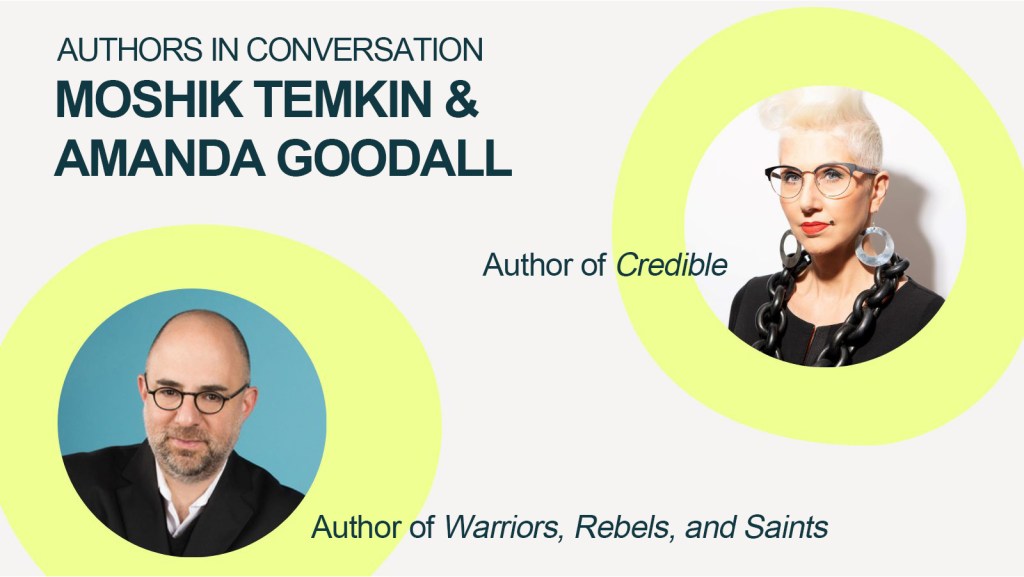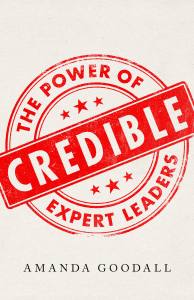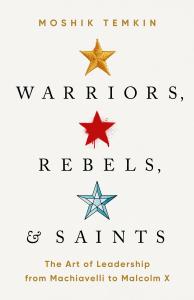To fight climate change, what kind of leader do we need?A conversation with Amanda Goodall and Moshik Temkin

What kind of leader is best able to deliver the technological innovations, economic transformations, and bold political maneuvering that the climate crisis demands? Should it be a climatologist with copious knowledge of the problem? Or a corporate titan who can make the business case for a sustainable future? Or maybe it’s a manager who’s able to unify disparate parties and competing interests?
To answer these questions, we recruited two experts in the leadership field. The first is Amanda Goodall, Director and founder of the Executive Masters in Medical Leadership at Bayes Business School in London and the author of Credible: The Power of Expert Leaders.
The second is Moshik Temkin, former associate professor of history and public policy at the Harvard Kennedy School and author of Warriors, Rebels, and Saints: The Art of Leadership from Machiavelli to Malcolm X.
These two discuss the surprising environmental policies of Margaret Thatcher and Richard Nixon, whether expertise is fundamentally elitist, and the ways that inequality makes leadership even more difficult.
Their interview has been edited for length and clarity.
PublicAffairs: Amanda, before we get to the question of what kind of leadership we need to confront the climate crisis, we have to talk about experts. You argue in your book that we’re experiencing the decline of the expert and the rise of the middle manager. What do you mean by that?
Amanda Goodall: Simply put, it’s become troublingly common to put unqualified people into top jobs. Particularly in the US and the UK, there’s a certain business culture that values generalists, like consultants and business school grads. That means that non-experts often sit on corporate boards and choose the CEOs, who are frequently generalists as well. And when those CEOs fail, they stroll out of their last elevator ride with golden parachutes worth millions.
That might be more palatable if these middle managers were particularly competent, but they aren’t. Data from industries as disparate as Formula 1 racing to aeronautical engineering to education shows that generalists underperform compared to experts from those fields. And not only that, but they aren’t even aware of their own incompetence. As one study found, the longer that uninformed executives stayed in their roles, the less they deferred to experts and the less they were able to identify competence in others.
This problem is especially present in medicine, the field I study most. In another study, fewer than 4% of nearly 6,500 U.S. hospitals were headed by physicians. People often point out to me that running a major organization requires a lot more than practicing medicine. For example, you need to manage budgets and huge teams of staff. But the best hospitals in the U.S. are run by doctors, not general managers, which reinforces for me that many leadership skills and qualities can be acquired much more easily than industry-specific expertise can be.
PA: Great, now that we’ve identified the problem, let’s move to that question about climate change. I assume you’d advocate for an expert leader, but an expert in what?
AG: It’s funny because it might not be the leader you expect. I spent my youth pounding the pavement as an anti-Thatcherite, but what’s interesting about Margaret Thatcher is that she was a scientist. She was a chemist at university, and she was the first person to raise the red flag about climate change at the United Nations. In fact, apparently her raising this flag was the kind of trigger for all the anti-climate business activism that started at this point. So as much as we might dislike her, she conceded that this was a problem.
But today, you’re unlikely to even see a chemist in government. Most government policy people, none of them have science degrees. Our politicians all did humanities or bullshit like that. Not to be rude — I love history — but we need science in our politics and in our government, and that’s something that worries me.
Moshik Temkin: I agree with you, Amanda. There are a lot of ironies like that in the United States. We don’t think of Richard Nixon as a particularly progressive person, but he’s the one who also raised the alarm about the environment. It was his administration that created the Environmental Protection Agency. He wasn’t a trained scientist, but I don’t need the leader to be an expert in science necessarily. Amanda, maybe that’s where you and I differ a bit. I more want that person to respect science. I want that person to respect technology, but not just for its own sake. Instead, as a means for protecting the public good.
But a major problem today is that we live in a world of astonishing technological and scientific progress and advancement that’s happening at breakneck speed. But, the number of people who actually understand the science and technology, who have access to it and can afford to use it and benefit from it, that’s an exceedingly small portion. And that’s a big problem in our politics all over the world. Experts are seen with great suspicion. They’re seen as remote elites who are very distant from the concerns of ordinary people. For that reason, it’s very hard politically to tackle climate change.
PA: Amanda, do you want to address this idea that experts are somehow elitist?
AG: [Here’s] one interesting statistic — if you just think of the size of a CEO’s salary compared to the average worker’s in that person’s firm. In the fifties, it might have been 30-to-1. It’s now something like 300-to-1. And people who fail in that position get huge packages of money when they leave. For me, this group is the real embodiment of elitism. They get sacked after five minutes but have built that into their contracts, so they can go right on to managing another company the following week. It isn’t experts we should be disdainful of. It’s a managerial class that is so grossly overpaid and so underperforming. There was a golden age in America when you could make it from a postboy to a CEO. You needed to work very hard. You needed to work your way up. But you could do it.
MT: I agree that this kind of inequality is another grave threat to the world. We’ve had leaders who recognized the threats we faced, like fascism, and understood that the best way to protect ourselves is to make sure our society has in place very basic things that keep people safe. I wanted to write about FDR because he and his wife came from very rich families, but they understood noblesse oblige, this idea that they had a responsibility to people who were less fortunate than them. He understood that if he wanted to protect democracy, if he wanted to avoid the United States going down the path of Nazi Germany, they had to keep the social fabric at a basic level. He knew that was the key, and that translated into very successful leadership.
That may be the kind of leadership we need again when it comes to climate change, but honestly it’s hard to say. Unfortunately, there’s no magic solution to this problem.

